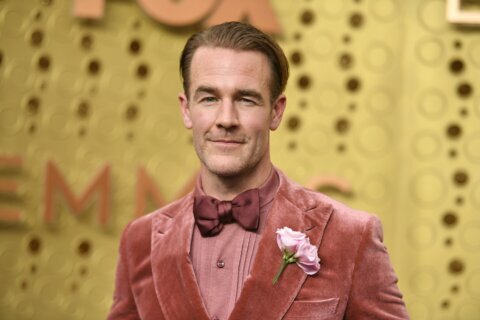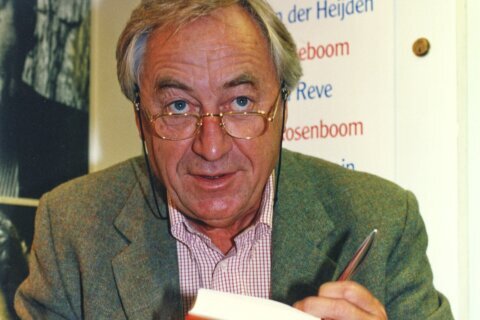It’s rare for a film to kidnap our attention from the start and hold us captive until the end.
That’s exactly what the new thriller “Windfall” does as it premieres on Netflix this Friday, a compelling combination of Alfred Hitchcock and Michael Haneke in all the best ways.
The story follows a scorned man who breaks into a billionaire’s empty vacation home, but things go awry when the mogul and his wife unexpectedly arrive for a last-minute retreat.
After comedies like “Forgetting Sarah Marshall” (2008), Jason Segel shows his range as the kidnapper, oozing paranoia each time his captives take a step too close. He’s a desperate man seeking “life-changing money,” standing in for the downtrodden, blue-collar workers screwed by the top 1% who control 16 times more wealth than the bottom 50%.
“You were deemed redundant and let go,” surmises the tech tycoon, played with douchey arrogance by Jesse Plemons, who’s having quite a run with “The Irishman” (2019), “Judas & The Black Messiah” (2020) and “The Power of the Dog” (2021). “The world is filled with lazy loafers,” he says as his wife retorts, “Not everyone who needs help is a freeloader.”
Therein lie the cracks in the marriage between the kidnapped couple, a cocky fat cat who paid off his wife’s student loans so she that could start a nonprofit. Lily Collins steals the show, showing far more depth than her early role as Snow White in “Mirror Mirror” (2012), snorting, “My husband is the only man who could fall asleep during his own kidnapping.”
While Segel and Plemons are locked in their ways — desperately poor vs. untouchably rich — Collins showcases the best character arc. In the film’s most telling monologue, she confides to her captor about her wedding day, realizing that her decision to either run away or take that first step down the aisle would drastically change her life for the next 40 years.
Every such confession pays off, thanks to a tight script by Andrew Kevin Walker, who wrote one of the best screenplays of all time in “Se7en” (1995). The “Windfall” premise is similar to Michael Haneke’s Austrian hostage gem “Funny Games” (1997), only now it feels concocted specifically for the pandemic era with a limited cast filmed in a single location.
Here, Walker co-writes with Justin Lader and Charlie McDowell, who teamed on the brilliant fantasy thriller “The One I Love” (2014), starring Mark Duplass and Elisabeth Moss as a troubled couple who tries to heal by escaping to a vacation home, only to encounter doppelgängers of themselves next door. If you’ve never seen the film, go find it. It’s genius.
Between that movie and this, McDowell is quietly emerging as one of our most impressive directors. He may not yet have the name recognition as his more famous contemporaries, but he is turning in such fascinating genre work that I’m dying to see what he does next. He also happens to be Collins’ real-life husband, adding weight to the marital tension.
His directorial style hooks us right from the very beginning, starting with a static shot of the lavish outdoor patio that patiently waits during the opening credits. He then sets the story in motion by panning to the right to show ominous orange trees, then cuts to a shot looking up through the treetops as rays of sun dance toward the camera like fate waiting.
McDowell uses slow disclosure to reveal Segel, who we think is chilling at his own vacation home, only to realize that he’s indeed robbing it as he scavenges through the dresser drawers. The revelations continue as the couple arrives, forcing Segel (and the audience) to hide around the corner, hoping not to be seen. It’s all visually riveting in its simplicity.
In a world where too many directors are obsessed with quick cuts and flashy camera moves, McDowell holds in static shots that allow us to take in the image. Note the shot inside the sauna looking out as Segel forces the married couple inside, the camera staying with them in silhouette, then sitting in total darkness even after he closes the door.
He routinely shows instead of tells. Rather than Plemons saying, “Honey, what’s the WiFi Password?,” McDowell simply cuts to Collins holding the WiFi router behind the television, panning to the left to show Plemons and Segal through a doorway at a table in the other room trying to figure out how to wire the kidnapper some funds without looking suspicious.
As time wears on, they hold an impromptu screening of “Three Amigos” (1986) on their outdoor movie screen, as Collins laughs at Steve Martin, Martin Short and Chevy Chase. Not only does it show the power of movies (i.e. prisoners watching the Pluto cartoon in “Sullivan’s Travels”), it also shows that Collins had a carefree side before her husband.
The word “Hitchcockian” is thrown around a lot, often by people who don’t understand the master’s iconography. They use it to describe anything chilling, but while it occasionally included shower slashers and dive-bombing birds, Hitchcock was mostly about ordinary people tired of their boring lives who naively get caught up in dangerous situations.
McDowell lovingly creates Hitchcockian suspense upon the arrival of a fourth character (Omar Leyva), a groundskeeper with dreams of becoming a landscape architect. The moment that we the audience know something that a character on screen doesn’t know is the difference between horror and suspense, which is the true essence of Hitchcock.
Most Hitchcockian is the haunting score by Danny Bensi and Saunder Jurriaans, who are clearly inspired by Bernard Herrmann’s masterful music in “Vertigo” (1958), which for my money is the greatest movie score of all time (that’s right I said it). Specifically, press pause on your Netflix around 2:42, 20:00 and 42:50 and bask in the “Vertigo” homages.
It all builds to not one, but two shocking moments in the third act. Depending on your taste, you’ll either appreciate the swerves or not (I gasped out loud and clapped with approval). Either way, if you go back and add up all of the breadcrumbs, it makes complete sense.
Thrillers come and go, but “Windfall” will stick with me for quite a while.









